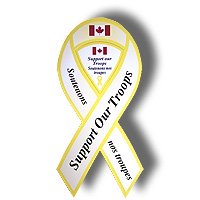Grieving Father Lashes Out  TROY FLEECE FOR THE TORONTO STAR
TROY FLEECE FOR THE TORONTO STAR Ben Walsh, with a portrait of his son Jeff Walsh, in his Regina home last night. A Canadian soldier has been charged with manslaughter in Jeff Walsh’s death last summer.
Dead soldier’s family angry over military’s handling of manslaughter investigation
Mar 13, 2007 04:30 AM Bruce Campion-Smith OTTAWA BUREAU
OTTAWA–A grieving father is slamming Canadian military police officers who probed his soldier son's death in Afghanistan, saying the family was kept in the dark while the investigation dragged on for months.
"I don't like any family being treated like we've been treated ... . They certainly have a lot to learn in dealing with the public and grieving families," an emotional Ben Walsh said last night.
The retired Mountie had harsh words for the shabby treatment served up by military investigators on the same day that a manslaughter charge was laid against a soldier in connection with the death last August of his son, Master Cpl. Jeffrey Walsh.
Master Cpl. Robbie Fraser, a member of Walsh's regiment based at CFB Shilo in Manitoba, was also charged with one count of negligent performance of duty.
Walsh died while on a patrol west of Kandahar. Last week, another Canadian soldier died in his tent after being shot in an apparent accidental discharge of a rifle. That shooting is still being investigated.
Last night, Walsh and his wife Margie called Fraser to express their sympathy and concern for the suffering that soldier was facing, too.
"My wife and I, we know what pain we went through. There's nothing now that is going to bring back our son," he said.
"It was just a routine chat. I told him he certainly should get good legal counsel and I hoped to meet him one day and just to hang in there.
"You cannot go on hating people. It's not right. We can only be there and I hope one day we will meet Robbie."
Fraser's mother called the Walsh family later to express her appreciation for the gesture.
Jeff Walsh, a 33-year-old father of three, was just six days into his second tour of duty in Afghanistan when he was killed. From the outset, military investigators made it clear that enemy action wasn't suspected but were tight-lipped about the exact circumstances.
But yesterday, they revealed that Walsh was sitting beside Fraser in the back seat of a G-wagon when a rifle discharged.
"A shot was fired and Master Cpl. Walsh was hit," said Lieut.-Cmdr. Pierre Babinsky, spokesperson for the Canadian Forces legal services.
Walsh had nothing good to say about the Canadian Forces' National Investigation Service, the special branch of the military police that looks into sensitive incidents and was responsible for yesterday's charges.
"They're in a domain of their own and I think they express the attitude that they're untouchable," he said in telephone interview yesterday from his Regina home.
"I will not let this rest ... . Like I told them, `I'm not done with you yet.' I do hope they learn from this. That's all I want – that they treat families in a fair, fair way."
The veteran police investigator said he was at a loss to explain how an investigation into the shooting in the back of an army vehicle could take seven months to wrap up.
As the investigation dragged on, Walsh said he wrote the Provost Marshal – the military's top cop – as well as Gen. Rick Hillier, the chief of defence staff, seeking answers.
It was only after his wife got on the phone crying in frustration that a military prosecutor – not the NIS – provided a few responses to questions posed by the family.
"I told them I've done murders, rapes and major crimes and sat down with families and opened the files up. They don't believe in that," said Walsh, who did praise the support offered by staff at CFB Shilo.
Walsh says he also spoke yesterday to the family of Cpl. Kevin Megeney, a 25-year-old reservist, shot and killed in an apparent accidental shooting in his tent last week.
The National Investigation Service is probing that shooting, too, and Walsh said he hopes the Megeney family fares better.
"My main concern is to not see the Megeney family have this dragged on for seven or eight months," he said.
Babinsky defended the length of investigation, calling it a "complex" probe.
"These are very serious charges. The National Investigation Service took the time it needed to ensure that the investigation was thorough, was complete," Babinsky said.
"When you end up charging someone under these accusations, you want to make sure there's no second guessing."
Because the manslaughter charge against Fraser was laid under the Criminal Code, he could face the same penalties as a civilian – a minimum term of four years and maximum sentence of life imprisonment if convicted.
The case now goes to Fraser's commanding officer, who together with legal advisers determines if the charges will proceed, said Babinsky.
From there it gets referred through the chain of command to the director of military prosecutions, in essence the Canadian Forces' "Crown attorney," for review if there's enough evidence for a "reasonable" prospect of conviction.
If evidence warrants, a formal charge paper is submitted to the court martial administrator who will convene a court martial, likely to be held at CFB Shilo.
It's up to Fraser's commanding officer to decide his status until the charges have been decided. A military lawyer will be appointed to represent Fraser.
The second charge of negligent performance of duty, laid under the National Defence Act, brings possible penalties of a fine up to dishonourable discharge from the Canadian Forces.
The death and the charges have again put the spotlight on weapons handling by troops in Afghanistan, which is dictated by the rules of engagement.
In the camp, the soldiers are expected to carry their weapons but with the magazines off and bullets removed from the chamber.
But "outside the wire," soldiers are primed for action, with magazines attached and a "bullet up the spout," meaning a round is in the chamber and ready to fire.
That enables a soldier to respond quickly if trouble breaks out but it also raises the potential for accidents.
"The potential of getting in and out of the vehicle with all that bloody kit on and things catching on the vehicle – it can happen," said retired major-general Lewis MacKenzie.

 If in Toronto, see one of our soldiers speak at the U of T today. This is the info on the meeting:
If in Toronto, see one of our soldiers speak at the U of T today. This is the info on the meeting:


 Tuesday, March 27, 2007
Tuesday, March 27, 2007

 Marching along Main Street in Listowel, ON
Marching along Main Street in Listowel, ON Putting the final touches on the shamrocks.
Putting the final touches on the shamrocks.







 Canadians can now purchase official Support Our Troops t-shirts and ball caps at Sears Canada, with two dollars from each purchase going back to morale and welfare programs for CF members and their families.
Canadians can now purchase official Support Our Troops t-shirts and ball caps at Sears Canada, with two dollars from each purchase going back to morale and welfare programs for CF members and their families.
















































